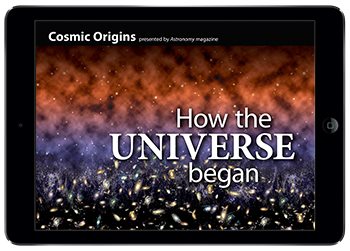 In March, we introduced Cosmic Origins, a tablet app you can download and then purchase four fabulous interactive products that lie within. Three of these article packages focus on different categories of objects in the cosmos, like planets, stars, and galaxies. The fourth focuses on the universe itself. Each of the four products — essentially digital special issues — is chock-full of new research and fun ways to learn more about that science.
In March, we introduced Cosmic Origins, a tablet app you can download and then purchase four fabulous interactive products that lie within. Three of these article packages focus on different categories of objects in the cosmos, like planets, stars, and galaxies. The fourth focuses on the universe itself. Each of the four products — essentially digital special issues — is chock-full of new research and fun ways to learn more about that science.
In the product How the universe began, you can watch astronomers describe the earliest moments of the cosmos, learn how the slight temperature differences in the early universe led to modern-day large-scale structure, step through animations showing how hydrogen and helium formed, listen to the hiss of the Big Bang’s residual radiation, and more.
Some 13.8 billion years ago, the universe began in an instant. That Big Bang brought time, matter, space — everything in the cosmos — into existence. In the past century, astronomers have learned an incredible amount about the moments following the universe’s creation. They now know that 95 percent of the cosmos is made of up of things we can’t see — called dark matter and dark energy — and have learned how the first elements formed out of the hot, dense cosmos. Scientists even have theories about how the Big Bang happened, what might have preceded it, and how the universe could end.
The quest to understand our incredible cosmos is what inspired the staff of Astronomy magazine to create the digital publication How the universe began. This interactive guide describes what scientists know about the universe’s evolution — and the radiation and matter that fill it.
You can download the Cosmic Origins app at the Apple App Store (for iPads) or the Google Play store (for Android tablets), which allows you to then purchase How the universe began. You can also preview the product and the three others in Cosmic Origins at www.Astronomy.com/cosmicorigins.